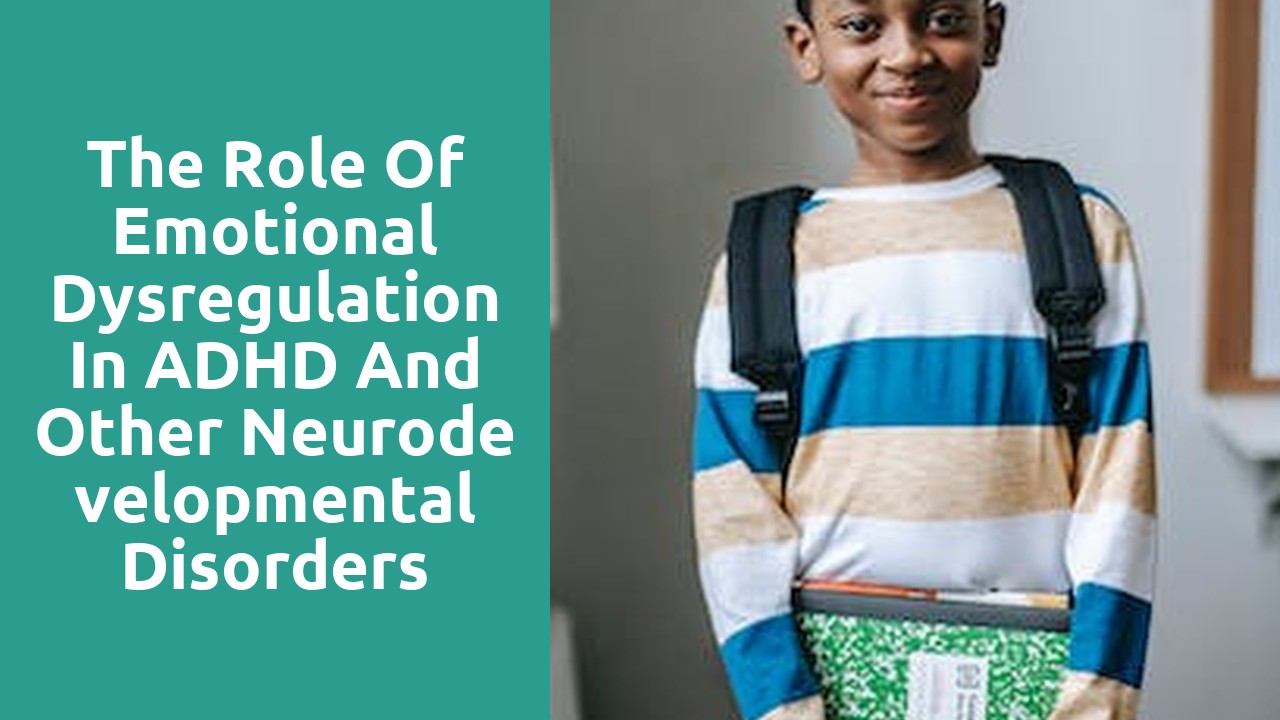

Neurodevelopmental disorders can have a profound impact on the emotional well-being of individuals. These disorders, which include conditions such as autism spectrum disorder, attention deficit hyperactivity disorder (ADHD), and intellectual disabilities, can manifest in various ways, including difficulties with emotional regulation.
One of the primary emotional challenges faced by individuals with neurodevelopmental disorders is the difficulty in recognizing and understanding their own emotions, as well as the emotions of others. This can lead to challenges in social interactions and relationships, as individuals may struggle to respond appropriately to social cues or express their own emotions effectively. Additionally, emotional dysregulation can often result in heightened levels of frustration, anger, or anxiety, which can further impact the overall emotional well-being of individuals with these disorders. Understanding and addressing these emotional challenges is crucial in providing support and interventions for individuals with neurodevelopmental disorders.
Emotional regulation plays a crucial role in the lives of individuals with neurodevelopmental disorders. These individuals often experience difficulties in managing and expressing their emotions, leading to significant challenges in their daily lives. However, by unraveling the connection between emotional regulation and neurodevelopmental disorders, researchers have made significant strides in understanding and addressing these challenges.
One aspect that has emerged from this research is the impact of emotional dysregulation on social interactions. Individuals with neurodevelopmental disorders often struggle to understand and respond appropriately to social cues, resulting in difficulties in forming and maintaining relationships. By focusing on improving emotional regulation skills, clinicians and therapists can effectively support individuals with neurodevelopmental disorders in their social interactions, leading to better outcomes and improved quality of life. Additionally, interventions that target emotional dysregulation have shown promising results in reducing behavioral difficulties and enhancing overall well-being in individuals with neurodevelopmental disorders. By exploring the intricate connection between emotional regulation and neurodevelopmental disorders, researchers and practitioners can continue to identify effective strategies and interventions that will empower individuals with these conditions to thrive.
Neurodevelopmental disorders, such as autism spectrum disorder (ASD), attention deficit hyperactivity disorder (ADHD), and learning disabilities, are often characterized by challenges in emotional regulation. Beyond just difficulties with attention and behavior, individuals with these conditions often struggle to effectively manage and express their emotions. This emotional dysregulation can manifest in various ways, including intense outbursts, emotional meltdowns, difficulty in recognizing and understanding emotions, and challenges in forming and maintaining relationships.
Understanding and addressing emotional dysregulation in neurodevelopmental disorders is crucial for the well-being and overall functioning of individuals affected by these conditions. Research has shown that emotional regulation difficulties can significantly impact various areas of life, from academic performance and social interactions to mental health and overall quality of life. By exploring the underlying mechanisms and contributing factors to emotional dysregulation, researchers and clinicians can develop targeted interventions and strategies to support individuals with neurodevelopmental disorders in managing their emotions more effectively. These breakthroughs in emotional regulation can provide a path towards improved outcomes and enhanced overall functioning for those affected by these complex conditions.
Navigating the Emotional Rollercoaster: Insights into Neurodevelopmental Disorders
Living with a neurodevelopmental disorder can often feel like being on an emotional rollercoaster. Individuals with these disorders experience a wide range of intense emotions, sometimes without a clear understanding of why they are feeling the way they do. This emotional turbulence can leave them feeling overwhelmed and struggling to regulate their emotions effectively.
One of the key insights into navigating this rollercoaster is understanding the role of emotional regulation in neurodevelopmental disorders. Emotional regulation refers to the ability to manage and control one's emotions in a healthy and adaptive way. For individuals with neurodevelopmental disorders, such as autism spectrum disorder or attention deficit hyperactivity disorder (ADHD), emotional regulation can be particularly challenging. However, by developing strategies and techniques that help regulate emotions, individuals with these disorders can gain a greater sense of control over their emotional experiences and improve their overall well-being.
Individuals with neurodevelopmental disorders often face a hidden struggle that goes beyond their primary symptoms. Emotional dysregulation is a common challenge that affects those with ADHD and other similar conditions. This ongoing battle with emotions can significantly impact their daily lives, relationships, and overall well-being.
Emotional dysregulation refers to difficulty in managing and controlling one's emotions effectively. It can manifest as frequent mood swings, excessive anger or irritability, impulsivity, and emotional overreactivity. For individuals with ADHD, emotional dysregulation can be particularly overwhelming, as it adds another layer of complexity to their already challenging symptoms. It can lead to difficulties in social interactions, worsen academic performance, and affect their overall quality of life. Understanding the hidden struggle of emotional dysregulation in neurodevelopmental disorders is crucial in order to provide targeted interventions and support for those who are affected.
Breakthroughs in emotional regulation have paved the way for more effective management of neurodevelopmental disorders. Researchers and clinicians have made significant strides in developing strategies to help individuals with conditions such as autism spectrum disorder (ASD), attention-deficit/hyperactivity disorder (ADHD), and sensory processing disorder (SPD) regulate and express their emotions more effectively. These breakthroughs not only improve the well-being and social functioning of individuals affected by these disorders but also provide support for their families and caregivers.
One major breakthrough in emotional regulation is the use of cognitive-behavioral therapy (CBT) techniques. CBT helps individuals identify and challenge negative thoughts and behaviors, ultimately leading to improved emotional regulation. For example, individuals with ASD often struggle with rigid thinking and difficulty adapting to changes in their environment. By using CBT, therapists can help them develop flexibility and adaptability, which in turn leads to better emotional regulation. Additionally, CBT teaches individuals relaxation techniques and coping strategies to manage stress and reduce emotional dysregulation. This therapy approach has shown promising results in improving emotional regulation in individuals with neurodevelopmental disorders, giving them the tools they need to thrive in various social and emotional contexts.